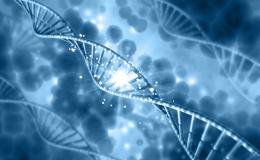Are You at Risk for Lynch Syndrome?
March 22, 2021
Lynch syndrome isn’t a disease you hear about every day. Despite the syndrome’s relative obscurity, it’s responsible for an estimated 3% of all colon and endometrial cancers.1

In recognition of National Lynch Syndrome Awareness Day today, we highlight the syndrome and its risk factors to improve disease awareness, screening and diagnosis.
Lynch syndrome is one of the most common hereditary cancer syndromes, or inherited gene mutations (changes) that increase an affected person’s likelihood of developing various forms of cancer. An estimated 1 in 300 people are thought to carry an adverse gene mutation associated with Lynch syndrome.2 Inherited mutations in Lynch and other hereditary cancer syndromes typically have a 50% chance of being passed down from an affected parent to their child. These mutations alter the way a gene works by “misspelling” the genetic code, and mutations that cause hereditary cancer syndromes often alter the function of genes responsible for controlling cell division. This altered gene function is present in virtually every cell of an affected person’s body from birth, increasing the likelihood that enough additional mutations will accumulate over time for a cell to become cancerous and divide uncontrollably.
Lynch syndrome, in particular, is associated with mutations in the genes MLH1, MSH2, MSH6, PMS2 and EPCAM. Adverse mutations in these genes increase an affected person’s likelihood of developing primarily colon and endometrial cancers but also increase the risk of developing stomach, kidney, ovarian, sweat gland, small intestine and other cancers. Patients that harbor a Lynch syndrome mutation may also have a strong history of early-age colon and/or endometrial cancer diagnoses on one side of their family.
Anyone who is concerned about their family history of colon, endometrial and/or other cancers should seek the help of a physician to formally assess their risk for Lynch or other hereditary cancer syndromes. Your doctor may determine that your risk level is high enough to warrant genetic screening and may refer you to a genetic counselor trained to guide you through the screening process. The genetic counselor will learn more about your family’s cancer history and determine which screening test is most appropriate for you. Screenings typically require only a single blood or saliva sample to test for mutations in a variety of genes associated with hereditary cancer syndromes, including Lynch syndrome.
The only way to definitively diagnose a hereditary cancer syndrome is through genetic screening, and diagnosing these syndromes can affect more than just a patient’s awareness of the disease. If testing reveals that a person possesses a mutation associated with Lynch syndrome, for example, healthcare providers can develop a risk management strategy based on the cancer risks associated with their specific mutation. A Lynch syndrome diagnosis may also warrant genetic screening of a patient’s family members because of the hereditary nature of the disease. Importantly, diagnosis with Lynch or another hereditary cancer syndrome does not guarantee a patient will develop cancer in their lifetime; rather, their gene mutation increases the risk of developing certain types of cancer. Today, genetic screenings, cancer screenings and innovative treatments make it possible for affected patients to not only be aware of their familial cancer risk, but also proactively manage that risk with increased disease surveillance and preventive therapies.
The ExpedioTM Hereditary Cancer Screening tests 33 genes for mutations associated with hereditary cancer syndromes, including Lynch syndrome. Click here to learn more about ExpedioTM, or contact us with any questions you may have regarding genetic screening.




